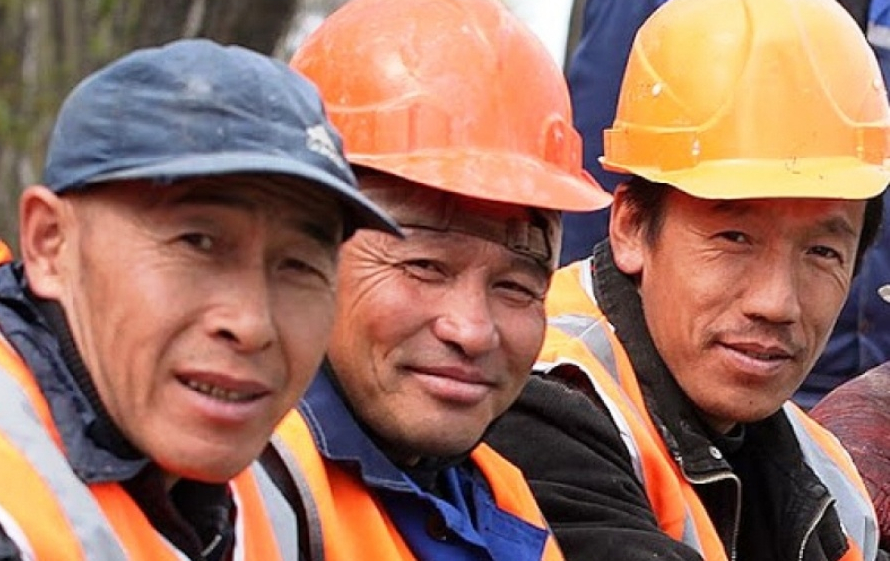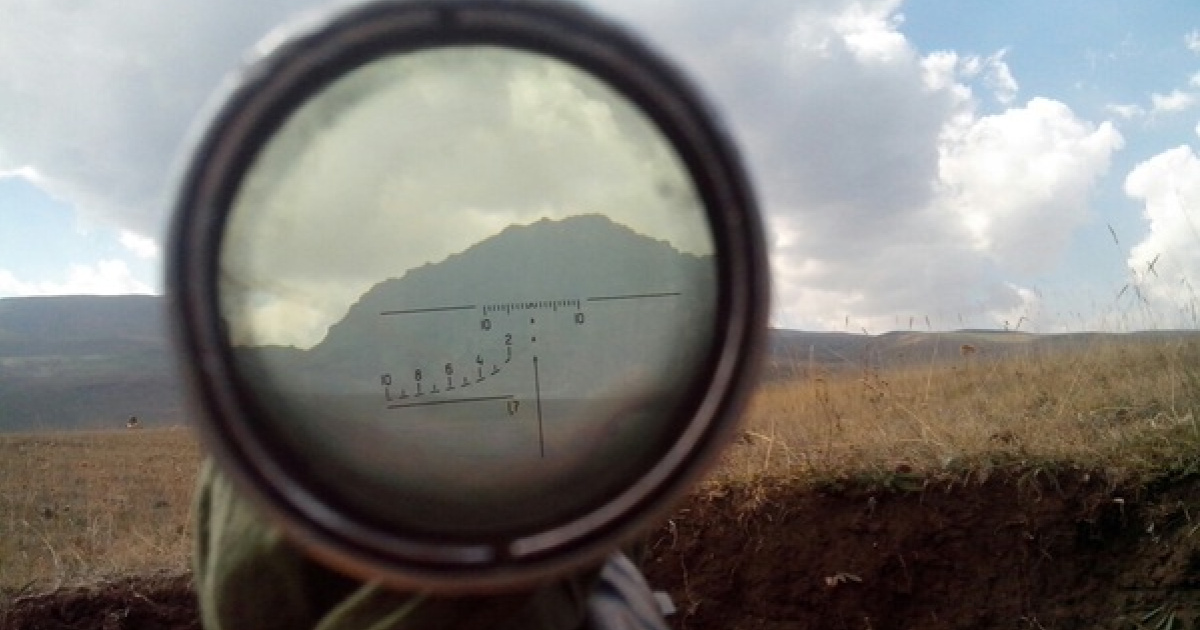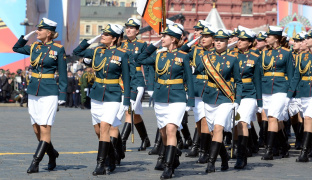It is hard to imagine, but the fact is: the Russian press that previously having sputtered with tirades against the "budding" "Donbass republics" began to doubt of them increasingly. "Will the Donbass be able to build new economy that is separate from Ukraine and survive?", - the pro-Kremlin Komsomolskaya Pravda asks the question, and already admits: "the fact that people in the DPR and LPR do not die of hunger is the merit of Russia". Other media also begin to recognize: "the independence" of the "LDPR" is a total bluff…
"War Socialism" of the Donbass"
Komsomolskaya Pravda decided to find out "what does the Donbass build - "war socialism" or heaven on earth?".
The media adduces a kind of two different opinions - of its special correspondent Dmitriy Steshyn acting as an "optimist", and of the economic columnist of the newspaper Yevgeniy Arsiukhin who risked becoming a "pessimist".
"A strange, schizophrenic situation has developed in the Donbass by the third year of independence. Dozens of the largest factories and mines worked in the territory of the DPR and LPR. Owners of these possessions did not accept the Russian Spring categorically, and, as soon as the banking sector turned down the work in the Donbass - they left for Kyiv, leaving the managers. Managers were paid well - up to $15 thousand per month. These enterprises gave taxes to Kyiv, they also exported the extracted energy resources and finished products there", - the "optimist" Steshyn gives an introductory.
He sadly states that "the Donbass enterprises paid $1.8 billion of taxes on profits and $26 million of the so-called "war tax" in just two years". "This is in addition to the targeted inflows to the so-called "oligarchic territorial battalions", assistance to Ukrainian military transport and many other things. Absurd! But they were not able to stop this "war rent" in Donetsk and Luhansk physically - money from the Donbass went to Kyiv, and from there - again to the Donbass, but on the other side of the front - to punishers", - Steshyn told.
At the same time, he sadly adds again that "working men of the Donbass received only average wages, high-explosive fragmentation shells at their homes every night and pathetic packages with "Akhmetov's" humanitarian aid" from their oligarchs who sweetly live in Kyiv, as a gratitude for the created "surplus value"".
"All this accounting was known and somehow endured in Donetsk and Luhansk. But when Kyiv announced blockade, and mines and factories in the Donbass simply began to stop, patience has run out. It was impossible to "preserve" this situation further, leaving everything as it was… Only state formations can survive in such a situation, even receiving the unprecedented assistance from a big brother - Russia. Even with the prefix "quasi". The conglomerate of militia groups with charismatic leaders at the head, "the gathering of field commanders", "the tribal council" - will always lose even to a weak state in this confrontation", - the "optimist" Steshyn twists.
He is convinced: "Under the conditions of sluggish war and under the threat of a large-scale offensive on the part of state which outstrips the Donbass by resources by times, the only possible option of existence is "war communism","totalitarianism with a human face", planned or "mobilization economy" – the case is not in terms, but in essence. A rigid vertical of military and civil power without parliamentary demagoguery and behind-the-scenes struggle. And while the threat of attack is not lifted, the measure of what is going on will be the ongoing war and the expectation of the Ukrainian blitzkrieg".
Where Komsomolskaya Pravda saw optimism in the abovementioned is a separate issue.
The "pessimist" Yevgeniy Arsiukhin is more convincing.
"I am not at all surprised that the authorities of the unrecognized republics decided to ultimately nationalize large industrial enterprises… I am not surprised because the manner of reshaping property and business is common to almost all newly formed territories. The DPR and LPR are not creatively different in this. The problem is that inviolability of private property is the basis of the economy. Because the economy is not about spirituality, morality and sobornost… It is about money and property. When you know that you can lose property at any moment, the question arises - why do I need this? And the economy ends. The sovereign economy begins, almost always – the mobilization one", - the "pessimist" Arsiukhin warns.
According to him, "the authorities of the DPR and LPR do exactly the same thing that Lenin did in 1918 by introducing "external management"". At the same time, Arsiukhin is sure that "the republics" will need about 15 years "to replace the old caste of executives with a new one, grown by them".
"If they have this time at all. The very existence of these republics is too fragile. Whether they will return to Ukraine or join Russia, or remain quasi-independent. But it will definitely be imposiible without the prefix "quasi". The Donbass is too tightly clamped between Russia and Ukraine. There is nothing left to do but dream of recognizing or helping by the rest of the world", - the "pessimist" Arsiukhin comes out into the open.
Arsiukhin firmly states: "We must remember once and for all: the fact that people in the DPR and LPR do not die of hunger and sometimes even tolerably exist is the merit of Russia. But Russian aid has limits, into which it bumps (or has already bumped), there are limitations".
"Firstly, these are fears of Russia to fall under new sanctions if it works directly with the DPR and LPR through the normal trade and financial institutions. Secondly, Russia's attempts to build compound schemes of interaction with the LPR and DPR through the semi-recognized countries like South Ossetia only double the uncertainty and chaos…", - Arsiukhin argues.
After failing to find the reasons for optimism, the "pessimist" Arsiukhin helplessly admits that "Russia could screw up its eyes and attach the DPR and LPR".
"Thereby it would save not so much the economy of Donbass as many human lives. And it would be right ultimately because there is nothing more valuable than a human life. But Russia is afraid to do it. It does not want a new round of accusations from the West in the "Moscow's aggression" and sanctions. Or, maybe, it still hopes to prevent the whole Ukraine from joining the EU and NATO with the help of the rebel Donbass. As a result, Donetsk and Luhansk are forced to experiment with building their economical paradise. They need to live here and now", - Arsiukhin obscurely concludes.
"The DPR and LPR enterprises come under the control of Kurchenko"
Unlike Komsomolskaya Pravda, a rather serious media, Kommersant-Vlast, tries to precisely find out "who runs the factories in the territory of the self-proclaimed DPR and LPR" in a businesslike way.
The media found that "from the beginning of April, the management of Ukrainian factories located in the territory of the self-proclaimed DPR and LPR was entrusted on ZAO Vneshtorgservis, registered in South Ossetia".
"The list includes Donetskstal Metallurgical Plant, Yenakiieve and Makiivka Metallurgical Plants, Yenakiieve Coking Plant, Yasinovsky Coking Plant, Makiivkoks, Khartsyzk Pipe Plant", - Kommersant-Vlast states.
"For example, one of the workers of Komsomolsky mines management in Starobesheve district of the DPR sent documents Vlast, which provided evidence that this enterprise was re-registered as "branch No 8"of ZAO Vneshtorgservis on March 28. Yenakiieve Metallurgical Plant became the "branch No 2" of Vneshtorgservis, the re-registration of employees began there on April 1. The workers of Donetsk Metallurgical Plant began to write applications for job in the "branch No 1" of Vneshtorgservis from the same day. The process of transfer of factories under the new manager started in the LPR in the beginning of March", - is noted in the publication.
Kommersant-Vlast emphasizes that "ZAO Vneshtorgservis has not acquired either an Internet site or an office for the past month since then": "None of the documents of the self-proclaimed republics specified who leads this company and to whom it belongs".
"It was said in the appeal of the Krasnodonsky territorial organization of trade union of workers of the coal industry to the workers of Krasnodonugol local enterprise that after the introduction of external management there since March 1, the former owner - Metinvest company of the Ukrainian oligarch Rinat Akhmetov – had stopped its work at enterprises since March 15. The external management was introduced in Krasnodonugol - ZAO Vneshtorgservis. Now the company is being registered in the territory of the LPR, - was said in the message of the trade union, published on March 20. - Coal enterprises, including Krasnodonugol and metallurgical plants, will join it. It is proposed to build a vertically integrated company that will operate in the territory of the LPR and DPR. Vladimir Pashkov is the Director General of the company", - is said in the publication.
Who is Vladimir Pashkov? Kommersant-Vlast found out that Pashkov worked as the vice-governor of the Irkutsk oblast until 2014, he resigned from the Irkutsk government at his own free will in early 2014 and moved to Moscow.
"The former Irkutsk vice-governor also became the president of charitable Fund for the Support of International Humanitarian Projects, registered in December 2015. The fund has no website, there is not a single report of it on the information portal of the Ministry of Justice…", - the media states.
At the same time, Kommersant-Vlast stresses that "on February 25, the Security Service of Ukraine had released a statement noticed by a few people in Russia at the time, accusing the Fund of Pashkov of being used to fill the budget of the self-proclaimed LPR".
"According to the intelligence service, "the LPR budget" provides for the inpayment of more than $193 million for the first quarter of this year. The terrorists' leaders are able to collect only $35 million using their own resources, - the SBU statement said. - The rest of the sum is planned by way of receiving financial assistance from the government of the Russian Federation. The puppet charitable Fund for the Support of International Humanitarian Projects (the President is Russian citizen Vladimir Pashkov) was choosen as one of the mechanisms for filling the terrorists' budget in order to conceal the Russian financing of the pseudo-republic and avoid additional economic sanctions against the Russian Federation", - Kommersant-Vlast reminded.
It was possible to contact Pashkov thanks to his former Irkutsk colleagues. "He has agreed to an interview at first, offering to get in touch by phone in a few days. "Now I am traveling around the territories", - he said. But he either did not answer the phone in the following weeks, or said he was at the meeting and offered to call later", - the media notes.
The publication also states that "the former deputy of the Verkhovna Rada and the former presidential candidate Oleg Tsaryov who had moved to Russia in 2014 told Kommersant-Vlast that, according to him, the businessman Serhiy Kurchenko who had fled from Ukraine after the victory of Euromaidan stands behind Vneshtorgservis".
"The fact that the control over their enterprises was transferred exactly to Kurchenko, was also told to Vlast by the workers of Yenakiieve Metallurgical Plant, Khartsyzk Pipe Plant and Ordzhonikidzeugol coal enterprise (it unites six mines in Horlivka and Yenakiieve, some of the equipment was previously sawn for scrap by fighters of the armed forces of the DPR and LPR)", - the media adds.
Kommersant-Vlast also recalls that "on March 1, when the external management was being introduced at the enterprises in the DPR and LPR, the SBU had published intercepted conversation of Zaharchenko with an unidentified Russian citizen who appeared in the conversation with callsign Sieryi".
"It turns out that we take all the enterprises now instead of Kurchenko, - Zakharchenko was complaining. - You understand the situation: Kurchenko will take everything from us that are the best". The interlocutor of the head of the DPR had promised to discuss this situation with someone in Moscow".
"In his turn, the Minister of Industry and Trade of the self-proclaimed DPR Alexey Granovskiy confirmed to Vlast: "Vneshtorgservis is led by Vladimir Pashkov with Russian citizenship, he was an adviser to the head of the republic on economic issues befor that, we will not disclose who stands behind him in order not to do harm to our partners". To the clarification question, which partners he was talking about, Granovskiy replied: "We have one partner - the Russian Federation", - the publication notes.
"After the introduction of external management in factories in the territory of the DPR and LPR, three main questions really arose: how to ensure the supply of raw materials to the territory of the self-proclaimed republics, so that enterprises can continue to work; who will pay salaries to workers instead of Metinvest; where to sell the manufactured products", - the media points out.
And adds: "In mid-April it became known that the first of these three issues is being solved with the help of the Rosreserve".
"Vneshtorgservis, headed by Pashkov, should decide on the issue of paying salaries and selling products, at least at this stage. The Minister of Industry and Trade of the self-proclaimed DPR, Alexey Granovskiy, assured Kommersant-Vlast that the issue of paying off wages arrears to workers will be resolved in the coming weeks. The issue of marketing is more complicated. On April 27, the authorities of the DPR announced that the Yenakiieve Metallurgical Plant and Khartsyzk Wire Cable Plant had renewed their work after a forced pause. Commenting on the launch of the blast furnace N5 at the Yenakieve Steel Works, the head of the DPR Alexander Zakharchenko told that it can smelt 1.5 million tons of cast iron per year, with "70% of the output going to the domestic market, surplus goes for export". But the big question remains: why should the republics produce so much metal, how will they pay for it, and who will risk buying products from the DPR and LPR and getting under sanctions", - the newspaper concludes.
"Shevchenko never considered himself to be a Ukrainian!"
The newspaper with the original for Russia title Svobodnaya Pressa (Free Press) published an article under the headline "Taras Shevchenko’s Betrayal”, in which it asserts that "Kyiv had to begin decommunization with the author of Kobzar".
"At some point, Ukrainian nationalist movement, not having any significant historical figures, "raised the flag of 19th-century artist and poet Taras Shevchenko”. But the activists of all sorts of movements and "OUNs" were unaware that they were unraveling the very "Bolshevik idol", - Svobodnaya Pressa says, which did not forget to decorate its website with a St. George ribbon.
"Modern adherents of the nationalist ideology often try to present Taras Shevchenko as "refined" Ukrainian nationalist, almost a spiritual father of Stepan Bandera. But is it so? Judging by his literary "recollections", Shevchenko suffered from the "pans" - that is, "landlords"... Many people say that Shevchenko did not like Russia. But is it so? And why? Firstly, Russians Bryullov and Zhukovsky made desperate efforts in order to redeem the young artist Shevchenko from the socage. And, secondly, Shevchenko never considered himself to be a Ukrainian! The greater part of his heritage is written in Russian. And even what is considered to be written in Ukrainian (for example, Kobzar and poem Haydamaky) originally sounded completely different. They were translated into the "modern Ukrainian" (just like that) much later", - SP says.
Svobodnaya Pressa happily reports that "the word "Ukrainian" does not occur even once in Shevchenko's works".
"If someone does not believe - please open Kobzar or any other of his books and launch a search on the page. There is "Ukraine", but there are no "Ukrainians". In those times, the term "Ukraine" did not have ethnic or political content, as well as, for example, Siberia or the Volga region. It was just a geographical name. Well, the person loved his native land. He could love the Smolensk region or the Don as well - without any nationalistic maxims", - the SP assures.
The newspaper also convinces that "the famous words of Shevchenko "Fall in love, oh dark-browed maidens, but not with the moskals" referred not to Russians, as some nationally concerned citizens say, but to soldiers...".
"After all, this term was used not for Russians or "Muscovites", but exclusively for imperial soldiers, outside the national context. The term “moskal” received its ethnic coloring probably in the XX century, and, most likely, with the help of the Austro-Hungarian advisers... ", - the Moscow media notes.
"Shevchenko himself wrote about Russian troops as of "his native" and spoke in Russian in everyday life without the slightest accent (according to Ivan Turgenev). The Bukvar (ABC-book), written by Shevchenko (published in 1861), was never Ukrainian, but was literally called "South Russian". Even in the correspondence of the gendarme department, Taras Shevchenko appeared as a "Russian writer", - SP does not stop.
"According to his "national" views, Shevchenko was a pan-Slavist. And his enemies were the landlords, not "Russians" or "Muscovites"! Under the impression of his bonded peasant youth, the artist became what we call a radical leftist, and his hatred was not national, but it had social class content. He did not care about the German or Tatar origin of a landlord. He disliked the autocracy, in which he saw the "concentration" of the landowner system he hated. And he romanticized the Cossacks not as a "Ukrainian" phenomenon, but as a social formation, which he saw as free and fair", - SP continues.
Svobodnaya Pressa assures that "it was the monument to Taras Shevchenko that was one of the first (or the very first) Bolshevik monuments in Moscow", and the Communists did nothing but constantly took decisions on perpetuating Shevchenko's legacy.
"In total, more than 30 monuments to Shevchenko were erected on the territory of the USSR... Hundreds of streets, squares, boulevards, parks, higher educational institutions, theaters, museums, factories were named in honor of the poet... In 1989, a metal ruble with a portrait of the poet was issued in circulation of 3 million copies. Postage stamps dedicated to his personality were regularly printed", - SP continues.
"The total circulation of his Kobzar alone (let us not dig too much into the question of how great was Shevchenko's contribution to the writing of this book, although there are some scientific doubts in this) amounted to more than 8 million copies", - Svobodnaya Pressa declares.
What is the point of these Moscow tirades? Just to blame Ukraine for the fact that in comparison it did "nothing for perpetuating Shevchenko's memory and propaganda of his legacy".
"In fact, there are two mythological images of Shevchenko - the "Soviet" one and the "Bandera" one, picked up by the modern Kyiv regime. In both cases, the role of the poet is very strongly hypertrophied in the historical process. His personality is too "sleek", but from the political point of view, the "Soviet" image is still much closer to the truth. If Shevchenko were alive nowadays, he would be not a nationalist, but a radical communist", - Svobodnaya Pressa seriously declares.
"It turns out that the Ukrainian decommunization should begin with the figure of the "favorite poet" of the Soviet government, who in his time became a true symbol of "communist Ukraine" in the framework of the Soviet localization policy", - the Russian media concludes.
"The scale of dependence is large"
Director of the Institute of Energy Policy Vladimir Milov dwelled upon the issue of why it is difficult for Ukraine to do without Russian coal in an interview to the RBK.
"Under current conditions, Ukraine can get "coal independence" from Russia only at the cost of rolling blackouts for industry, which can interrupt the economic growth that has begun", - Milov said. He suggests "to look objectively at the Ukrainian energy balance and try to assess the seriousness of the situation".
Assessing the "gas sovereignty" of Ukraine, Milov notes that "everything is relatively simple with natural gas".
"First of all, Ukraine extracts about 20 billion cubic meters per year on its own, which covers, roughly speaking, half of the national needs. Secondly, unlike coal, gas is universal: if the power station or boiler house is gasified, you do not care about the origin of the fuel, you simply take the standardized gas from the pipe. This created the prerequisites for a reorientation towards European imports. Ukraine completely refused to import gas from Russia in 2015, and the missing amount is covered by imports from the EU - almost 90% from Slovakia, as well as from Hungary and Poland", - the author notes.
At the same time, he points out that, in his opinion, "Ukraine could have gone another way and rapidly increase its own production from 20 billion to 30-35 billion cubic meters per year and turn into a self-sufficient gas country, but this is hampered by the unwillingness of the Ukrainian authorities to reform the gas sector".
"Ukrainian nuclear power plants have become another factor of energy independence: since 2013 they have only slightly increased output, but in the context of the economic recession and a drop in demand for energy resources, their share in electricity generation increased from 50 to 60%, and in the total share of electricity and heat production - almost to 50% (from 36% in 2013)", - Vladimir Milov emphasizes.
Analyzing the role of "non-alternative coal" in the economy of Ukraine, Milov notes that "in the case of coal it is not that easy to reduce the dependence on imports".
"This is a common problem: coal stations and boiler houses are usually designed to burn a specific grade of coal, which vary greatly depending on their origin. For natural historical reasons (no one in the Soviet times could have imagined that Russia and Ukraine would fight and impose embargo), most Ukrainian power plants and boiler houses are tied to brands of anthracites mined in the Donbass. The scale of the dependence is large. In connection with the blockade, we are talking about the loss for the market of about 10 million tons of anthracite, more than a third of the volume of coal consumption by Ukrainian power plants. The share of coal here is also high: 38% in electricity generation and 34% in total electricity and heat production, although it was slightly reduced from 2013, when there were 46 and 39% respectively", - Milov said.
In his opinion, "if Ukraine does not find alternative sources of coal supplies, large-scale rolling blackouts for industry are inevitable, which will create serious problems for economic growth".
At the same time Milov warns: "The import of coal from Russia in the first quarter amounted to more than 50% of the total Ukrainian imports. Replacement Donbass and Russian anthracite is now being sought in the US, South Africa, Poland and other countries, but this is not an easy task. The world coal market is not so flexible: unlike oil and gas, more than 80% of the world's coal is consumed directly by producer countries, more than two thirds of the sold coal are supplied to countries in the Asia-Pacific region that lack their own coal. It is not so simple to quickly find additional volumes of supplies for Ukraine at moderate prices".
"By the way, it is exactly for the same reason that extractive enterprises of the unrecognized regions of Donbass will find it difficult to sell their coal after Ukraine's refusal to buy it. They will not be able to resell Donbass coal through Russia if Ukraine refuses to import coal from Russia as well. In the end, the Donbass coal will begin to compete with Russian export in the Chinese market. Who knows, maybe Ukraine expects precisely this effect by imposing an embargo", - Milov admits.
"Frankly speaking, if the Ukrainian authorities had made quick reforms in the past few years and opened gas industry for private investors, the increase in production and the related conversion of power plants and boiler houses from coal to gas would have already yielded results in the form of reduced dependence on imports. As always, everything returns to the question of political will", - the RBK author concludes.
The review by Mykhailo Karpenko, OstroV




